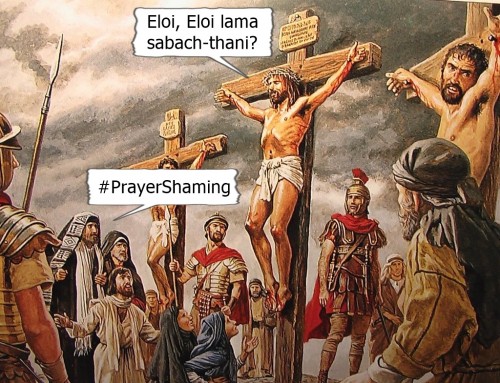I have a scheduled Holy Hour on Tuesday evenings at my parish’s Perpetual Adoration chapel. It’s a wonderful respite from the chaos and clutter from the every day – a sacred time, in the most dangerous Safe Space ever conceived. Face to face with the Savior, the King of the Universe – nothing hidden, nothing unknown. Yet simultaneously utterly peace-filled. I enter, burdened by sins and woes the world, the flesh, and the Devil would convince me as unforgivable and insurmountable. Some burdens are incinerated by the Light of mercy, while others are offered as paltry penances in acts of reparation. And Christ, in his inestimable wisdom, permits some to remain upon my shoulder for a little while longer, offering His grace so I might bear manfully those crosses deemed necessary for my salvation. I depart, not a new man, but a man renewed.
It lasts for a few moments. That’s how weak I am.
I bring with me one of my favorite spiritual books – it’s an old one, originally written in the 16th century. It’s called The Sinner’s Guide, by Venerable Louis of Granada. He was, according to the book, the favorite spiritual writer of St Teresa of Avila, St John of the Cross, St Francis de Sales, St Charles Borromeo, St Vincent de Paul, and St Rose of Lima. My copy is dog-eared and tattered, passages underlined and bracketed, a few of the pages separated from the spline – a year from now, a rubberband will keep pages from scattering.
I find myself repeatedly reading Chapter 27: Of Those Who Allege That The Path Of Virtue Is Too Difficult. Practicing and perfecting the virtues – the theological virtues being faith, hope, and love; the four cardinal virtues being prudence, temperance, fortitude, and justice – is a life-long pursuit. I certainly don’t allege that the path is too difficult; however, based on personal experience, I contend it is far too easy to stray from said path. Here are the opening paragraphs:
“As virtue is entirely conformable to reason, there is nothing in its own virtue which renders it burdensome. The difficulty, therefore, which is here objected arises not from virtue, but from the evil inclinations and appetites implanted in us by sin. The the Apostle tells us, ‘The flesh opposes the spirit, and the spirit opposes the flesh; for these are contrary to one another. For I am delighted with the law of God, according to the inward man; but I see another law in my members, fighting against the law of my mind, and captivating me in the law of sin, that is in my members.’ (Gal 5:17 & Rom 7:22-23). By these words we are taught that the law of God is acceptable to the superior part of the soul, the seat of the will and understanding, but that we are opposed, in obeying it, by the corruption of our appetites and passions, which reside in the inferior part of the soul.
“When man rebelled against God, the passions rebelled against reason – and from this arose all the difficulties which we encounter in the practice of virtue. Thus we see that many who appreciate virtue refuse to practice it, just as sick men earnestly desire health, but refuse the unpalatable remedies which alone would restore it. As this repugnance is the principal barrier to virtue, which, when known, is always valued and loved, if we succeed in proving that there is little foundation for such repugnance we shall have accomplished a good work.
“The principal cause of this illusion is that we only regard the obstacles to virtue, and do not consider the grace which God gives us to overcome these obstacles.”
The virtues only seem impossible because we focus on the obstacles standing in our way. We look at the sins and tendencies and habits, and think they are too much to overcome, or the price too high to pay. We tend to rely on our perceived strength, which is nothing, instead of relying on God, who will assist our efforts.
It’d be so much easier if God would remove the temptations, the passions, the appetites. Sometimes, He does. Most times, God leaves them as the are. How many times have you prayed, for instance, for an increase in patience – and then comes opportunity after opportunity in which to practice it? Like always, right? Just as muscles get stronger when they’re exercised, so do virtues when they’re practiced. Venerable Granada worded it this way:
“If they (passions, appetites, etc) remain, it is only to exercise our virtue, not to overcome us; to stimulate us, not to master us; to serve as an occasion of merit, not of sin; for our triumph, not for our downfall; in a word, to try us, to humble us, to make us acknowledge our own weakness and render to God the glory and thanksgiving which are due Him. They are a source of real profit to us. For as wild animals, when domesticated, can be made most serviceable to man, so our passions, when moderated and controlled, aid us in the practice of virtue.”
That right there sums up why Adoration is important to me: render to God all glory and thanksgiving, and receive His strength to continue on. Lord knows I have plenty to work on – charity, prudence, etc, etc.
It’s my opinion that this book, and others written around the same time (such as The Spiritual Combat by Dom Scupoli and Kempis’ Imitation of Christ), contain all the practical wisdom and deeper human insight anyone could possibly need. Straightforward, simple to understand, incisive, detached – sometimes I get the sense that more modern spiritual works have more to say about the author than they do about the material. This book is solely concerned about saving souls. I’m sure Granada didn’t let its popularity go to his head – but if he was ever tempted, he knew where to go to overcome them.
ps – if you have any prayer requests or intentions you’d like me to present to Jesus, feel free to leave them in the combox. It’d be an honor to pray for and with you!
Image source: LarryD
















